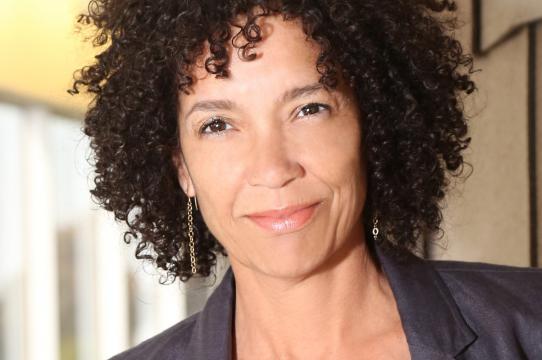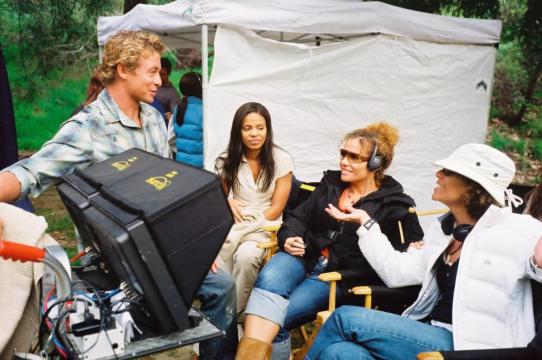Stephanie Allain is a rare gem in the film industry. Not only is she brilliant and successful, but as an African-American woman who got her start over 25 years ago in a notoriously and overwhelmingly white and male-dominated business, she has charged ahead to break open established perceptions.
“I’ve been involved in diversifying Hollywood since before it was hip,” she says. “And we are finally starting to see real change. There was a time when you’d see names on a directors’ list and there would only be white guys on it and no one would even blink. That time is over.”
As an independent film producer, Allain has her own production company and has served as the director of the LA Film Festival, transforming it into the most diverse film festival in the world. She’s also a board member of Women in Film, a founding member of ReFrame, and is a member of the Academy of Motion Pictures Arts and Sciences, Writers Guild of America, Producers Guild of America, and the Dramatists Guild of America.
Spending her childhood in both New Orleans, where she was born and visited every summer, and in Los Angeles, where she was raised and attended school, gave her a unique perspective on various cultures. Allain attended St. Mary’s Academy, a college prep high school in Inglewood where she excelled in literature and creative writing.
“I had no idea about the film business and how it worked, or what a producer or a studio executive did,” she says. “But I did love movies and books, so often I’d read a book and then go see the movie, and intuitively try to understand the connections between the page and the screen.”
When it came time to think about college, staying in LA and attending the University of Southern California (USC) seemed like the best choice. But after a couple of years, she got restless, left school, traveled to Hawaii, then moved to Madrid, all the while trying to find a place where she really belonged and could grow.
She found herself searching for just the right place to continue her education and, after a lot of research, decided that UC Santa Cruz was it. She applied to the creative writing program and started her new life. “I was a junior by then and immediately found my tribe. I also started daily dance classes in the Theater Department and made friends with Zeke Richardson who ran a KZSC radio show called Rebels Without Applause.” In fact, one of the Rebels’ actors, Mitch Marcus, became her first husband and the father of her two sons. She’s still close with many of the friends she made at UC Santa Cruz. “UC Santa Cruz was a great, nurturing ground for training in the arts and finding my people.”
Torn Between Academia and the Arts
While still at UCSC, Allain continued to study dance and writing and was encouraged by her dance teacher, Donald Byrd, to apply to CalArts for grad school to continue her dance studies. She found herself torn between academia and the arts.
CalArts won out but not before she realized that, even though she loved studying dance, she wasn’t ready to commit to the unpredictable life of a dancer. “I wanted to make money, and have a family so I moved to San Francisco with one of my fellow UCSC graduates and started working at Ballet Magazine,” she says. “I was still dancing and writing, and just living my best life.”
But then an unexpected development changed her path yet again. “My boyfriend, Mitch (also a UCSC graduate) and I ended up making a baby!” Being only 23 at the time, she knew that her entire life was about to take a dramatic turn. “I decided to move back home and try to figure out how I was going to support myself and this new baby.”
Allain started to really reflect on what she was good at and what she liked to do. Being naturally analytical, she carefully weighed her abilities and passions and heard about a job in the entertainment industry called a “reader”, thinking that getting paid to read would be the perfect career choice for her. And she persisted.
“I just went from one person that someone knew, who led me to another person…I worked for free…I worked for $25 a script...eventually I landed a job at Creative Artists Agency (CAA), which was the biggest talent agency in town, and worked in the story department as a reader, reading books and scripts. Through that job, I found out about another job at the studios called ‘story analyst’, and that it paid really well.”
Making connections that would change her life
From there, Allain landed a position as a story analyst at 20thCentury Fox, making fortuitous connections that would propel her rise within the industry. One of those key contacts was VP Amy Pascal who was so impressed with Allain’s writing, that she asked her to be her personal reader. When Pascal moved over to Columbia Pictures, Allain joined her there and ultimately was promoted from the story department to join the executive ranks.
In the process of becoming a creative executive, she also needed to find a replacement for her former position and was determined to find a person of color to fulfill that role. One of the applicants was a senior at USC School of Cinematic Arts who seemed much more interested in talking to her about his screenplay than interviewing for the job.
His name was John Singleton and his screenplay, entitled Boyz N the Hood, centered around three African-American male friends growing up in South Central LA with violence and crime enmeshed in their everyday lives. Singleton’s story was not the kind of subject matter that Hollywood typically embraced, especially in 1990, but Allain zeroed in on its brilliance and importance. She was determined to not only get it made but to have Singleton direct.
“Boyz N the Hood set the tone for my career,” says Allain. The film was also her debut as a production executive, requiring her to learn the intricacies of making a movie from the ground up. All of her hard work and dedication definitely paid off.
Starring Cuba Gooding, Jr., Ice Cube, and Laurence Fishburne, Boyz N the Hood garnered Academy Award nominations of Best Original Screenplay and Best Director for Singleton, who was only 24 years old at the time and was the youngest person ever nominated for Best Director, and the very first African-American to be nominated in that category. This landmark film was selected to be preserved in the National Film Registry for its cultural significance - a rare and distinguished honor - only 25 films are chosen each year.
“Boyz N the Hood made such a splash! It debuted at Cannes and had a 20-minute standing ovation… Academy Award nominations….” says Allain. “With that film, I really carved out a space for myself at Columbia, where I stayed for ten years, championing brown, black, and female-centered movies. Working with John Singleton really taught me to protect artists and their vision from unnecessary studio interference.”
Allain continued to supervise several successful projects including Singleton’s Poetic Justice. “I found [director/writer] Robert Rodriguez and brought him into the studio and we made El Mariachi and Desperado. I supervised I Like It Like That directed [and written] by Darnell Martin, a black, Puerto Rican director. It was very fulfilling and I was happy to open the door for my people, but I did feel the squeeze between the studio and the artist.”
She started to rethink where she wanted to go. It had been ten years since she had her first child, and another baby was on the way. It was time for a change.
“I looked for another job and I didn’t have to look far because the studio made a deal with Jim Henson Pictures and they asked me to run it.” Thinking that Henson would allow her to bring together her professional and personal life by making family movies, Allain eagerly took the job.
Turning disaster into success
But it turned out to be a disaster. “I made terrible movies and was fired,” she says. “And it forced me to assess what I wanted and who I was. I’d been working in a corporation at this point for nearly 15 years and got used to making a big salary and having all of the trappings associated with that which are very, very real. “Basically, I woke up one morning and said ‘I don’t want it anymore. I don’t want any of it.’”
She took time off to reconnect with her two sons, one of whom was a budding performer. 3 Arts approached her to be their in-house producer and she took the job wary that management wasn’t really her thing.
While there she came across a stirring and thoughtful script by a young, relatively inexperienced writer/director named Craig Brewer, called Hustle & Flow and knew the film deserved to be made. Not only did it have a black cast, but it flipped the glorified stereotype of a pimp, showing that even the lowest of the low could be elevated through artistic expression – specifically music.
Her passion for the project pushed her to take the plunge and sell practically everything she owned, including her house, in order to make it happen. “Hollywood 101 – never put your own money into movies, but I was really desperate for meaning and for artistic expression.”
She also called her friend John Singleton to tell him about the project and he ended up financing the entire film. Yet again, Allain recognized the potential of an outstanding screenplay and turned it into an outstanding film. Together she and Singleton produced the film and Brewer directed it.
Academy Award Firsts
Hustle & Flow was not only a huge commercial success but its lead actor, Terrence Howard, was nominated for an Academy Award for Best Actor and the film’s song, It’s Hard Out Here for a Pimp by Cedric Coleman and Three 6 Mafia, won an Academy Award for Best Original Song. Three 6 Mafia was the first hip-hop group to ever perform at the Oscars and win the Oscar in that category.
Allain founded Homegrown Pictures in 2003, and never looked back. “I’ve been producing independently for the last 15 years and I’ve been an artist riding the ups and downs of being hot, being not, of hit movies, of movies no one saw…and crafting a life of diverse content creation.”
Allain views the onslaught of digital formats as a means for up and coming filmmakers to get their work out in the world without needing to seek permission via big studios. She’s at a stage in her life where she’s seeing the people that she mentored start to mentor the next generation, and she’s excited about platforms such as Netflix and Amazon that are making it easier for all kinds of content to get produced.
"We're a company of all-black females..."
“It’s interesting to be open to new advancements and to not hold on too hard to how it was,” she observes. “My company, Homegrown Pictures, is now in TV, film, and digital platforms. We’re a company of all-black females pushing out content that humanizes people of color, and other under-represented folks.”
Homegrown Pictures produced Something New, Black Snake Moan, Hurricane Season, Beyond the Lights, Peeples, Dear White People, Burning Sands, French Dirty and more.
Allain stresses the power of representation and how important it is to have shows like Dear White People on the air. “I just produced a film with Alfre Woodard called Juanita (Netflix), and when I showed it to my mom and her friends, my mom started crying. She saw in that character someone like herself and felt represented on the screen…a middle-aged black woman as the main character.”
Allain has always appreciated how other women in the business opened doors for her and in turn she’s done the same for women trying to break in. “I think it’s a myth that women are separatists and only looking out for themselves. My experience has been quite the opposite.”
"Distinguish yourself by your work and your passion..."
Allain admits that what she does is hard work and can be a hustle…up one day and down the next. But because she absolutely loves what she does, it’s a risk worth taking, and she feels blessed that she can be creative every day, reading stories, going to casting meetings, sitting with directors and choosing projects she’s enthusiastic about.
For students who want to follow in her footsteps, she emphasizes how important it is for them to really understand who they are and what excites them, and then to immerse themselves in whatever that is and become an expert in it. “So many people talk about doing the work, but they don’t actually do the work. If you can distinguish yourself by your work and your passion, then you’re going to be ahead of the game.”
“It’s also key to commit yourself to being in it for the long haul because in Hollywood, you’re only as good as the last thing you made. “It’s a marathon! Have a long eye towards the ups and downs, hits and disasters, and, as my mother always told me…your assistant today could be your boss tomorrow…so rule number one is to always be nice!”
Allain attributes her early success to being willing to work hard – to take scripts home with her on the weekends and read through a stack so that she was fully prepared on Monday to discuss them. She also read everything else she could get her hands on, from newspapers to novels, to get an informed look at the world and give her a wider context for her work.
In spite of all of the hard work, she also appreciates having a personal life and realizes how that has contributed to her overall success. “It’s very important because it gives you a well of emotion and experience to draw from. Having kids in this business has been invaluable to me just as a human being.”
On May 1, 2018, Allain returned to the UCSC campus as one of the key speakers during the Arts Dean’s Lecture Series on Creative Entrepreneurship. The series featured a distinguished roster of arts practitioners, creative, educators, and advocates who provided illuminating insights, practical tools, and personal stories on how to shape an artistic or arts-related career in the 21st century. Allain’s inspiring talk, entitled From Employee to Employer, gave students a valuable insider’s look into what it takes to start out in the professional world and turn your dream job into a gratifying, lifelong career.
Allain looks forward to seeing what the next generation of students will bring. “I just hope that UCSC keeps turning out talented artists to send to Hollywood who will change the world for the better!”



